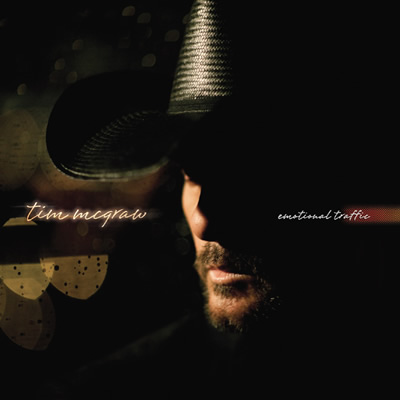Videos by American Songwriter
Tim McGraw
Emotional Traffic
(Curb)
[Rating: 3.5 stars]
Perhaps history has trained us to expect ambitious statements or divisive stylistic turns whenever an artist touts any delayed record fraught with label controversy as their “best album ever.” While it’s hardly shocking that Tim McGraw’s eleventh studio outing bears little resemblance to a Yankee Hotel Foxtrot or Trans, the total absence of risk characterizing the otherwise-serviceable Emotional Traffic remains disappointing.
Shortly after its completion way back in late-2010, Curb Records shelved Traffic to prevent their most profitable star from racing to the end of his contract, resulting in an ongoing legal battle between the label and McGraw. In the midst of this tension and in the months leading up to the album’s prolonged release, quotes from McGraw declaring Traffic to be his greatest musical achievement began popping up in web ads.
While that title still belongs to McGraw’s 2007 benchmark Let it Go, the stadium-sized crescendos of opener “Halo” give an early impression that the Louisiana-native might have simply mistook his biggest work for his “best.” On the surface, it’s a polite power ballad–not far removed from the type of thing retainer-faced tweens sway along with at christian rock festivals. But the bombastic swells and hair-metal solos that elevate the track run contradictory to its vulnerable, self-pitying chorus: “I’ll crawl out of my cradle/down into my black hole.”
McGraw takes another stab at arena rock pathos on the man-out-of-time rally “I Will Not Fall Down.“ Though less strained than “Halo,” it’s impossible to ignore the team of celebrity songwriters (including the Warren Brothers and Martina McBride) wasted here on clunky slogans like “What they call ‘progress’ will never wait for me.“
Considering the introspective misfires, it’s telling that Traffic’s finest moments arrive when McGraw looks beyond himself toward the hardworking denizens of surrounding cars. See album highlight “The One That Got Away”: an affectionately rendered profile of an unshakable kid-chanteuse that may or may not be McGraw’s reply to Taylor Swift’s name-dropping 2007 single.
More than anything, the song serves as a reminder of McGraw’s unsung abilities as a storyteller, a talent which often goes overlooked in the face of his chart-devouring motivational ballads and crossover excursions. For perspective, note what happens when the singer attempts to pepper a sermon with blue collar vignettes on the religious anthem “Touchdown Jesus.” The hokey inspirational bits fall flat while the more character-oriented verses shimmer with populist charm, redeeming an otherwise saccharine throwaway.
Elsewhere, “Right Back Atcha Babe” and “One Part, Two Part” are breezy, bubblegum country tunes–if heard from a distance, indistinguishable from the countless other bubblegum country tunes that have found their way from the bottoms of McGraw’s boots to constant CMT-rotation throughout the past three administrations. Still, it’s unfair to fault a seasoned carpenter for sturdy construction: Traffic’s fluffier moments are, as usual, infectious and crowd-pleasing.
With that said, if McGraw wants to soft-close this record dueting with R&B star Ne-Yo on an obvious rehash of his hit 2004 collaboration with Nelly, why not? The lovely “Only Human” finds McGraw returning to the hip hop/country crossover party he more-or-less started to teach the bandwagon how it’s done. Jennifer Nettles, Jason Aldean and Willie Nelson would be advised to take note.
As previously stated, Emotional Traffic marks the end of McGraw’s career-spanning relationship with Curb Records. While not exactly the consummate work the singer advertised, it’s a solid departure bursting with enough potential singles to suggest that the most-played male artist of the last decade will continue to dominate country radio beyond his former label. Or as the man warns on the currently charting “Better Than I Used To Be” — “I still got a few more dances with the devil.”














Leave a Reply
Only members can comment. Become a member. Already a member? Log in.